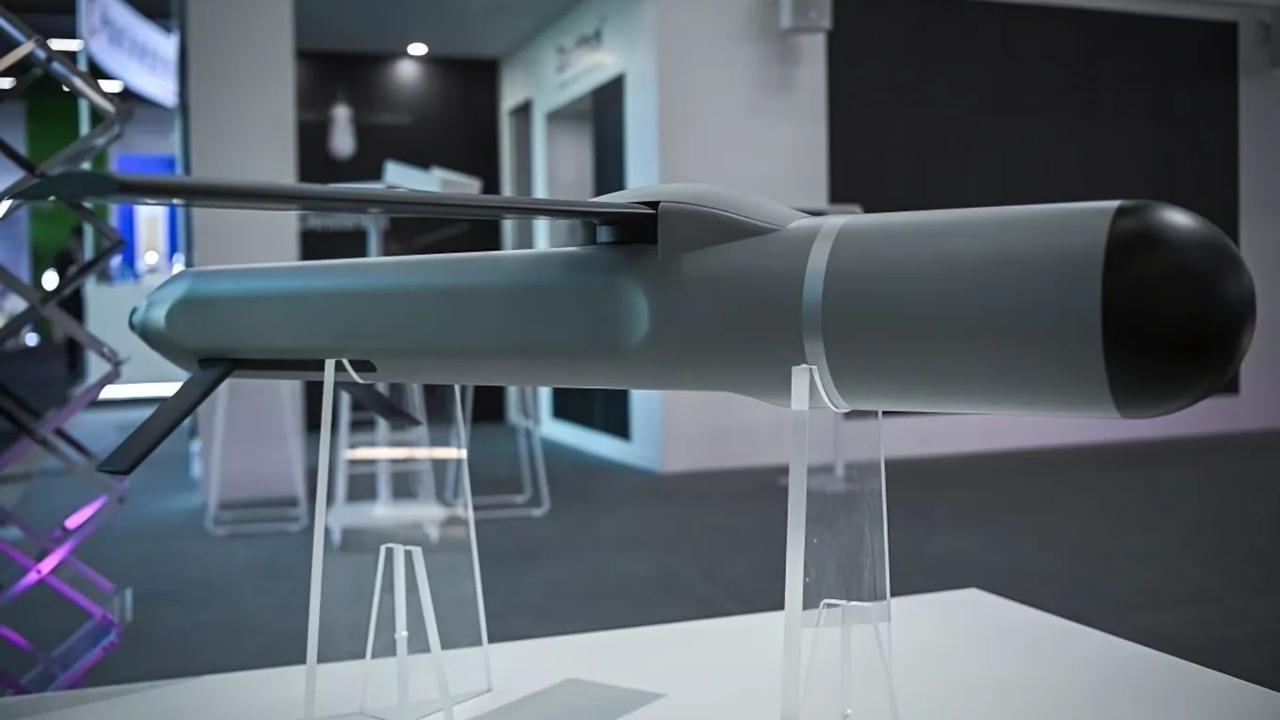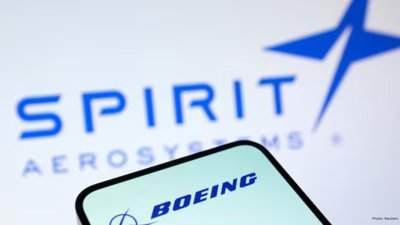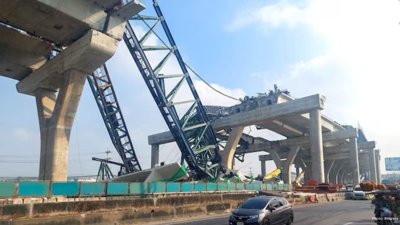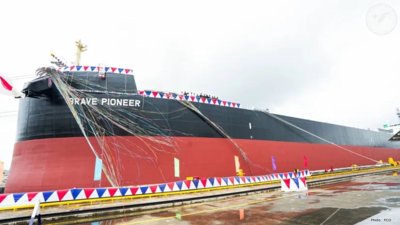
Post by : Amit
Photo : X / Bloomberg
Destinus Moves to Accelerate Autonomous Flight
Swiss hypersonic aircraft startup Destinus has agreed to acquire Zurich‑based avionics developer Daedalean. The acquisition brings advanced artificial intelligence capabilities directly into Destinus’s development pipeline as it races to build high‑speed, hydrogen‑powered aircraft designed for autonomous operation.
Destinus, founded in 2021, is developing a new class of hypersonic vehicles aimed at rapid cargo transport and potentially passenger services in the longer term. Daedalean, established in 2016, has built its reputation on creating safety‑critical AI avionics for piloted and unpiloted aircraft, with a portfolio of navigation, flight control, and vision‑based guidance systems that have attracted partnerships across Europe and North America.
By combining forces, the two companies hope to accelerate certification‑ready autonomous flight systems that meet stringent global regulatory requirements while pushing the boundaries of speed and efficiency.
A Strategic Acquisition in the Race for Autonomy
For Destinus, the deal is more than a technology purchase. It represents a strategic bet on integrating AI into the very core of its aircraft, rather than adding it later as an auxiliary system.
“Autonomy is not an afterthought for us — it’s fundamental,” said Destinus founder and CEO Mikhail Kokorich. “Daedalean’s team has built some of the most advanced AI avionics in the world. By bringing them inside Destinus, we can design our aircraft around these systems from the very beginning.”
This approach could set Destinus apart from competitors who are retrofitting autonomous capabilities onto existing platforms. Hypersonic aircraft, which fly at speeds greater than Mach 5, present extreme challenges for human pilots — not only because of the reaction times required, but also due to the need for constant data analysis from onboard sensors. AI‑driven avionics can manage these inputs more efficiently than human crews, while maintaining regulatory levels of safety.
Daedalean’s Expertise in AI‑Based Safety
Daedalean has spent years developing algorithms that help aircraft “see” and “think” in ways that meet strict aviation safety standards. Its AI systems combine machine vision, sensor fusion, and decision‑making tools capable of functioning even in poor weather, low visibility, or non‑GPS environments.
The company has worked closely with European regulators, including the European Union Aviation Safety Agency (EASA), to create guidance on how AI‑driven flight systems can be certified for commercial use. This regulatory experience is particularly valuable to Destinus, which will face rigorous oversight as it attempts to certify autonomous hypersonic aircraft — a category that currently has no precedent.
“AI will not simply be an assistant pilot,” said Daedalean co‑founder Luuk van Dijk in a past interview. “It will eventually become the pilot — but to achieve that, we need to prove it can meet or exceed human performance under all circumstances.”
Hypersonic Ambitions Meet Regulatory Reality
Destinus has already conducted several test flights of prototype vehicles powered by hydrogen fuel, positioning itself as part of the broader push toward zero‑carbon aviation. The company’s goal is to develop long‑range hypersonic aircraft capable of carrying cargo — and eventually passengers — across continents in just a few hours.
However, developing aircraft at such speeds requires solving major engineering, operational, and certification challenges. High‑temperature materials, fuel management, and thermal loads are technical hurdles. On top of that, regulators are still determining how to evaluate autonomous aircraft, let alone hypersonic ones.
By acquiring Daedalean, Destinus is signaling that it wants to embed safety and regulatory compliance early in its design process, rather than treating certification as a hurdle to clear at the end of development.
Industry Analysts React
Analysts view the acquisition as a bold but necessary step for a startup attempting to leapfrog traditional aerospace development timelines.
“Destinus is not just building an airplane — it’s building an entirely new category of flight,” said aviation consultant Richard Aboulafia. “Adding Daedalean’s AI avionics gives them a credible path to autonomy and helps regulators see that safety is being taken seriously from day one.”
Others note that the acquisition could give Destinus an edge in the broader advanced air mobility market. As both cargo and passenger aircraft programs experiment with autonomous systems, companies that can demonstrate reliable AI flight control will be positioned to win contracts with operators and governments seeking efficient, low‑carbon transport.
Financial Details Remain Confidential
Neither Destinus nor Daedalean has disclosed financial terms of the acquisition. However, industry observers believe the deal is structured to keep Daedalean’s engineering team intact while integrating its technology directly into Destinus’s hypersonic development program.
The move follows a wave of consolidation in the advanced air mobility sector as startups seek to secure critical technologies before competitors do. With AI avionics widely seen as a cornerstone of future aircraft, acquiring a proven developer like Daedalean gives Destinus a significant in‑house capability rather than relying on third‑party suppliers.
AI as a Flight Deck Standard
The partnership is expected to accelerate the timeline for bringing fully autonomous flight systems to market. Destinus says it plans to use Daedalean’s expertise to design an AI‑driven flight deck capable of handling everything from navigation and collision avoidance to emergency decision‑making without human intervention.
Although early aircraft may still include human oversight, either remotely or onboard, Destinus envisions a future where its hypersonic vehicles operate entirely uncrewed. Such a system would reduce costs, remove pilot fatigue issues at extreme speeds, and allow aircraft to operate more flexibly in congested global airspace.
Broader Implications for Aviation
The acquisition could have ripple effects across the aerospace industry. If Destinus succeeds in certifying autonomous hypersonic aircraft, it could set new regulatory precedents that benefit other developers of advanced air mobility platforms.
In the near term, AI avionics like Daedalean’s are likely to appear in piloted aircraft first, serving as advanced co‑pilots that handle routine flight tasks. Over time, as regulators gain confidence, these systems could transition into fully autonomous control.
“Certification will not happen overnight,” said aerospace analyst Graham Warwick. “But by putting AI at the heart of its design, Destinus is laying the groundwork for the long game — and for regulators, that matters.”
What Comes Next
Destinus is expected to continue flight‑testing its experimental aircraft while integrating Daedalean’s AI systems into future prototypes. Both companies say they are committed to working closely with European and U.S. regulators to define safety standards for autonomous flight at supersonic and hypersonic speeds.
The combined team will focus on demonstrating real‑world reliability, with initial milestones expected within the next 18 to 24 months. If successful, Destinus could unveil a fully autonomous test aircraft later this decade, potentially reshaping how high‑speed global transport is conceived.
The acquisition of Daedalean marks an inflection point not only for Destinus but for the wider aerospace industry. By uniting hypersonic propulsion and AI‑based avionics under one roof, Destinus is positioning itself to lead the next wave of aviation innovation.
While significant challenges remain — from thermal engineering to certification hurdles — the company’s decision to integrate autonomy from the outset may help it stay ahead of rivals and convince regulators that uncrewed hypersonic flight is not only possible but safe.
As the aerospace world watches, Destinus and Daedalean are betting on a future where speed, autonomy, and sustainability converge. If their vision holds, air travel could become faster, cleaner, and more automated than ever imagined.
Destinus, AI Avionics, Flight










Advances in Aerospace Technology and Commercial Aviation Recovery
Insights into breakthrough aerospace technologies and commercial aviation’s recovery amid 2025 chall

Defense Modernization and Strategic Spending Trends
Explore key trends in global defense modernization and strategic military spending shaping 2025 secu

Tens of Thousands Protest in Serbia on Anniversary of Deadly Roof Collapse
Tens of thousands in Novi Sad mark a year since a deadly station roof collapse that killed 16, prote

Canada PM Carney Apologizes to Trump Over Controversial Reagan Anti-Tariff Ad
Canadian PM Mark Carney apologized to President Trump over an Ontario anti-tariff ad quoting Reagan,

The ad that stirred a hornets nest, and made Canadian PM Carney say sorry to Trump
Canadian PM Mark Carney apologizes to US President Trump after a tariff-related ad causes diplomatic

Bengaluru-Mumbai Superfast Train Approved After 30-Year Wait
Railways approves new superfast train connecting Bengaluru and Mumbai, ending a 30-year demand, easi